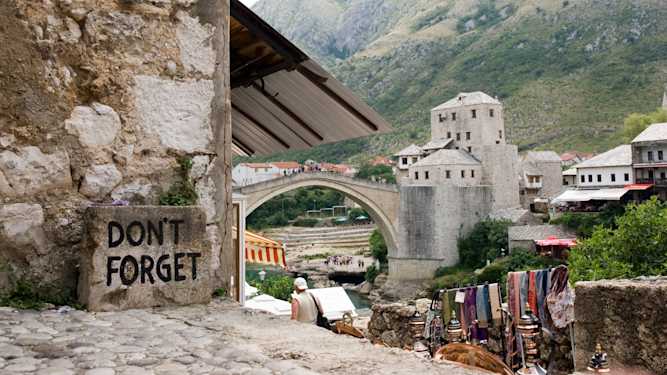
Bosnia 2025 - March
Throughout 2025, Ian Bancroft is collecting reflections on Bosnia-Herzegovina thirty years on from the end of the war. These reflections, supplemented by other insights and stories,explore various dimensions (peacebuilding, reconciliation, culture, education, politics), while reflecting on the past and the future.
To contribute your reflections on Bosnia-Herzegovina, please click here.
What is the real stick and what is the real carrot? People joke that they are being beaten with carrots.
Another anonymous contributor, this time from Sarajevo, confidently asserts that, ‘looking at other countries in both Western and Eastern Europe, I believe that Bosnia-Herzegovina is on an excellent path and far more developed than we and the rest of the world want to admit’. ‘Look at Bulgaria, Romania, Moldova, in terms of state structure and rule of law, then look at Western Europe in terms of mentality and tolerance’, they add, reinforcing their point without hesitation.
We are offered a multitude of indicators by which to assess the quality of life or the state of society. Some are more formulaic - wealth, poverty, income, growth - while others are more anecdotal, like the number of potholes. A Dutch friend once commented that there would never be mud on the road in the Netherlands. This, for him, was the sign of a dysfunctional state - the 'Mud Index'.
Nermin Hadžimešić from Goražde, who works in IT, makes a subtle point that goes to the heart of many of Bosnia-Herzegovina’s problems, namely that ‘the management of both resources and people needs to be humanized’. Many decisions are made through the lens of ethno-nationalism, meaning that individuals come second, if that.
He lists NATO accession before the EU; not necessarily because it is more achievable, but because many deem it vital for the country’s future security.
Nermin makes another important point - ‘citizens are eager for normal life in all areas - to have a job, freedom, and a democratic administration’. These are not unreasonable desires.
Harun Išerić, a lawyer from Sarajevo, thinks that ‘Bosnia-Herzegovina is in the nineties’; the most profound expression of pessimism that one can - and will often - find.
His pessimism is reinforced by ‘the lack of desire and will of the so-called liberal and so-called social democratic political parties…to build their political bases on the territory of the entities of Republika Srpska and the West Herzegovina, Posavina, and Livno Cantons, as well as to fight for the electorate residing in these political-territorial units’.
It is a point with two distinct dimensions. The first derives from the electoral limitations deriving from the fragmented institutional structure Dayton imposed upon the country which reduces the incentive to reach beyond ethnic and/or entity lines to appeal to voters. Elections divide rather than integrate communities.
The second - the tendency for political parties to plant themselves in the main urban centers - is more damning. The grassroots are either forgotten or intentionally ignored. Politics remains in an exclusive domain, defined by those who move in limited circles and geographical spaces.
Reinforcing the sense of pessimism is the extent of ‘comprehensive discrimination,’ as Harun describes it, faced by ‘those of Muslim religious and Bosniak ethnicity.’ It is discrimination that lacks an adequate legal response.
There are, however, things that bind the country’s citizens. For Harun, the fight for environmental protection and preservation of a healthy environment - [is] a unity that transcends entity and ethnic borders.’
We are offered a multitude of indicators by which to assess the quality of life or the state of society. Some are more formulaic - wealth, poverty, income, growth - while others are more anecdotal, like the number of potholes. A Dutch friend once commented that there would never be mud on the road in the Netherlands. This, for him, was the sign of a dysfunctional state - the ‘Mud Index’.
An anonymous contributor from Zenica insists that ‘the economy is generally progressing well’. ‘Looking at the number and variety of job vacancies advertised, it seems that there is enough work for those who want to work,’ they add.
It is not just about the decision-making structures, but the ‘policies that exploit such a system…[that] is still the main obstacle to greater progress for Bosnia-Herzegovina’.
‘It seems that the forces that are in favor of Bosnia-Herzegovina are slowly advancing and are overpowering those who want the disintegration of the state’, the source in a more optimistic moment pronounces, before adding that, ‘there is a lack of more interaction between individuals and communities of different ethnic origins’. Such contradictions of conclusion feel almost inevitable.
‘The situation in the world is not in favor of integrative factors’, they cautiously conclude, ‘however, Bosnia-Herzegovina remains a unified country’. It is an encouraging retort to a deteriorating global context.
To contribute your reflections on Bosnia-Herzegovina, please click here.
You can also contact Ian directly by clicking here.
Ian is a writer based in the Balkans. He is the author of 'Dragon's Teeth - Tales from North Kosovo' and 'Luka'. Follow Ian on Twitter @bancroftian.
Currently in: Belgrade, Serbia — @bancroftian
